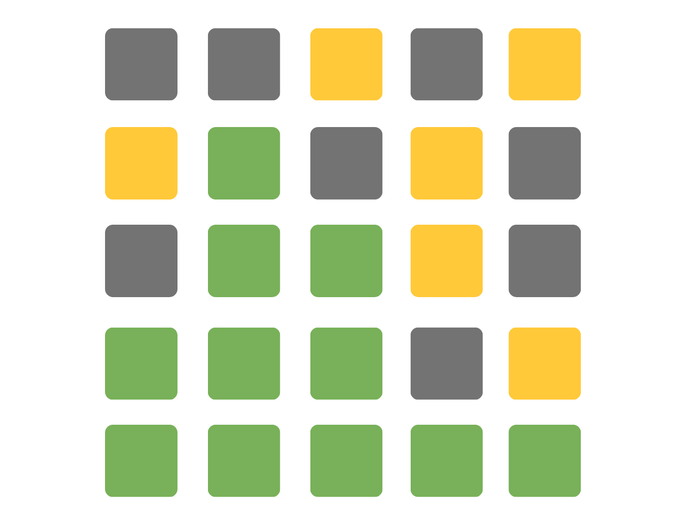And other random thoughts…

The lovely little 5 letter word guessing puzzle, Wordle, purchased by the NY Times, was originally developed by software engineer Josh Wardle for his partner, Palak. It has taken the world by storm and rapidly became popular. It has a very sweet background…if you’d like to read the story from the NY Times, here’s a link.
But why is it so perfect? In my opinion, there are several key factors that make it so delicious…
- It’s free – who doesn’t love free?
- It’s a website, not an app – which means you have to seek it out, it’s not screaming for your attention.
- There is only one-a-day – sorry, no binging!
- No ads – well, at least before the NY Times bought it – now there is a small plug for another Times puzzle
- It’s accessible. It’s a five-letter word, and not obscure.
- It automatically tracks your results for you – what a feeling of accomplishment 😉
- You can share your results without giving away the answer – a few months ago, after a bunch of my friends were sharing this on social media, I finally got curious enough to look it up. This helps to spread the joy of the game.
Basically, I love Wordle because it isn’t trying to take over my life. It is this perfect bite-sized amuse bouche of a puzzle. I give it my couple of minutes a day, not straining my brain, but definitely flexing it, it gives me a nice dose of dopamine, and then we move on. I love that it is not hijacking my day with all kinds of psychology driven strategies to keep me playing, ignoring my family and wasting my life. It’s a good game, finite and free. I love you Wordle.
I receive nothing from this endorsement, but have a try.
Why are yawns so contagious?

I was driving my kids home from softball practice last night, and I heard the faintest glimmer of a yawn from my son who was in the backseat. I immediately, and uncontrollably, yawned myself.
What the heck is going on here??
Well, it appears that this is one of those little mysteries that science is still not 100% sure about. In my research, the whole “your brain needs oxygen, so you yawn” theory that I grew up with has basically been debunked. But even if it is true, this doesn’t explain the contagious yawning, which can happen whether you’re tired or not, whether your body temperature has gone up or whether you just spent an hour deep breathing.
Researchers are still at work, but so far studies show that there is major social mirroring going on here, empathetic triggers in our brain, and that there is a heirarchy in which yawns are most contagious to us.
Basically, stronger bonds, like family and friends are more likely to trigger a yawn in us, with this tight bond significantly predicting contagious yawns when the trigger yawn was just heard and not seen (like my yawning from the front seat triggered by the back seat yawn of my boy). There is also a gender bias apparently – women are more likely to yawn in response to anothers yawn, and men are most likely to trigger others yawns. Oh come on!
Interestingly, this contagious reaction is limited to those with fully developed brains. In studies of those with mental developmental delays, children who haven’t yet fully developed this neural mechanism and adults with autism and schizophrenia, the contagious effect of yawning wasn’t seen.
But it’s not just humans yawning…all vertebrates yawn, but only humans, chimpanzees and dogs have been found to have contagious yawning.
I didn’t follow up with whether interspecies contagious yawning was a thing – but dog owners (or if you own a chimp, I’m not biased), did you ever catch a yawn from your dog and vice versa? Inquiring minds want to know!
And finally, the dangers of a distracted mind.

Lack of focus sucks. Right? When your mind is so distracted by the pings on your phone that you simply can’t get anything done in your long, long to-do list. When you’ve gone down some rabbit hole of social media, or late night googling, and you don’t have anything accomplished, but some random, superficial knowledge about why yawns are contagious.
I mentioned dopamine earlier in my bit about Wordle. Dopamine is a chemical that is secreted with pleasurable activities, upon accomplishing tasks and with positive social interactions. It serves to reward us for certain behaviors, subsequently motivating us to repeat them.
Those developers in the social media industry and gaming industry (casinos and video games) in particular are intimate with how this neurotransmitter works. A quick reflection upon our and our children’s behaviors on smartphones for instance can make us cringe when we think about just how prey we are to the machinations of others. There is a big business for our time and attention. However, while we are enjoying those dopamine hits, not much is getting done, yet others are profiting from our distraction.
In Charge of My Dopamine, thank you very much!
This isn’t a lecture on the evils of screens, though yeah, I’ve got strong opinions on that. Especially for our young developing minds, and those with a proclivity towards distraction and with impulse control issues.
Instead, let’s delve into other ways to get some of that dopamine to work for us.
There are a few different pathways in the brain upon which dopamine travels. They are associated with different cognitive and motor processes. Though they are distinct, they all act up when anticipating rewards.
For our purposes, let’s focus on the triggers of pleasure, movement, social interactions and accomplishments. Let’s move away from our phones, and into “real life.”
Movement can and should be pleasurable. We can all think of some pleasure we’ve gotten out of moving our bodies, even if we have pains and aches.
Even a good yawn can make us feel great (interestingly, yawning increases with dopamine), am I right? So satisfying. Along with that early morning stretch? Eating delicious food, great sex, dancing to the eighties…
What about when we set a goal and accomplish it? Like running a marathon, being able to touch our toes, or achieving a pinnacle yoga pose?
Let’s layer on when we do some of that stuff with loved ones and friends, upping the rewards with smiles and laughs.
Who needs a phone for that?
Research also shows that regular meditation can increase dopamine too, but that is often too lofty of a goal for many of us in our currently distracted state.
Dopamine, Motivation and Parkinson’s
Something I found very interesting was that one of the mechanisms that makes Ritalin and other methylphenidate drugs for ADHD work is by increasing the presence of dopamine in the pathways of the brain. This has the effect of increasing cognitive motivation, which rather than just giving someone “more focus,” it gave them the purpose and motivation to focus on a more challenging task.
Some more motivation for us as we age – Parkinson’s, a neurodegenerative disease, is associated with a major drop in dopamine in the nigrostriatal pathway (the main one associated with movement). Though we can’t claim to prevent Parkinson’s, a brain-healthy diet and lots of exercise go a long way to reducing our risk factors.
I want to encourage all of us to find great and natural sources to increase dopamine in healthy amounts. To move away from the addictive feedback loops that social media platforms, video games and binge watching creates in us.
This doesn’t mean that we can’t use screens ever – heck, what a hypocrite would I be? I just plugged Wordle and I have an online business! But getting into our bodies and feeling the sumptuous satisfaction of moving, having real, face to face interactions, maybe even sharing a yawn 😉 and a laugh, and perhaps setting a physical goal and working towards it (stayed tuned for a challenge!) – well, that doesn’t have to line the pockets of anyone or any industry.
The goal is to get more pleasure, more focus and more clarity in our life. Let’s foster stronger connections with our loved ones, nurture our bodies and minds, and extend our healthy life span.
Resources
https://www.nytimes.com/2022/01/03/technology/wordle-word-game-creator.html
https://www.frontiersin.org/articles/10.3389/fpsyg.2020.00442/full
https://www.sciencedaily.com/releases/2017/08/170831123031.htm
https://www.pbs.org/newshour/science/why-are-yawns-contagious-we-asked-a-scientist
https://www.realsimple.com/health/first-aid-health-basics/are-yawns-contagious
https://sitn.hms.harvard.edu/flash/2018/dopamine-smartphones-battle-time/
https://pubmed.ncbi.nlm.nih.gov/25012275/
https://www.healthline.com/nutrition/how-to-increase-dopamine
